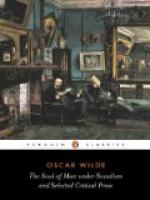In England, the arts that have escaped best are the arts in which the public take no interest. Poetry is an instance of what I mean. We have been able to have fine poetry in England because the public do not read it, and consequently do not influence it. The public like to insult poets because they are individual, but once they have insulted them, they leave them alone. In the case of the novel and the drama, arts in which the public do take an interest, the result of the exercise of popular authority has been absolutely ridiculous. No country produces such badly-written fiction, such tedious, common work in the novel form, such silly, vulgar plays as England. It must necessarily be so. The popular standard is of such a character that no artist can get to it. It is at once too easy and too difficult to be a popular novelist. It is too easy, because the requirements of the public as far as plot, style, psychology, treatment of life, and treatment of literature are concerned are within the reach of the very meanest capacity and the most uncultivated mind. It is too difficult, because to meet such requirements the artist would have to do violence to his temperament, would have to write not for the artistic joy of writing, but for the amusement of half-educated people, and so would have to suppress his individualism, forget his culture, annihilate his style, and surrender everything that is valuable in him. In the case of the drama, things are a little better: the theatre-going public like the obvious, it is true, but they do not like the tedious; and burlesque and farcical comedy, the two most popular forms, are distinct forms of art. Delightful work may be produced under burlesque and farcical conditions, and in work of this kind the artist in England is allowed very great freedom. It is when one comes to the higher forms of the drama that the result of popular control is seen. The one thing that the public dislike is novelty. Any attempt to extend the subject-matter of art is extremely distasteful to the public; and yet the vitality and progress of art depend in a large measure on the continual extension of subject-matter. The public dislike novelty because they are afraid of it. It represents to them a mode of Individualism, an assertion on the part of the artist that he selects his own subject, and treats it as he chooses. The public are quite right in their attitude. Art is Individualism, and Individualism is a disturbing and disintegrating force. Therein lies its immense value. For what it seeks to disturb is monotony of type, slavery of custom, tyranny of habit, and the reduction of man to the level of a machine. In Art, the public accept what has been, because they cannot alter it, not because they appreciate it. They swallow their classics whole, and never taste them. They endure them as the inevitable, and as they cannot mar them, they mouth about them. Strangely enough, or not strangely, according to




